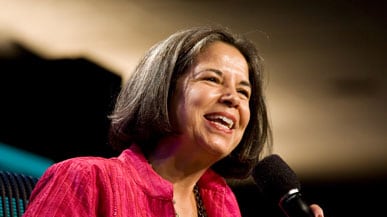Maria Otero has a tough job.
She represents an international powerbroker in a world increasingly skeptical of its role. And as undersecretary for Democracy and Global Affairs, she has a historic workload. Her mandate includes, essentially, the problems too big for the U.S. to solve on its own. On her agenda: nothing less than refugees, human rights, science and technology, and climate change. A few months ago, Secretary of State Hillary Clinton—her boss—added the issue of global water security to the pile. And on Human Rights Day this week, Otero led the charge for freedom—while trying to reconcile U.S. talk with its actions at home and abroad.
No big deal.
In the hectic world of 21st-century diplomacy, Otero is unusually calm, and very frank about the pros and cons of representing America. “Obviously we know that the U.S. is a superpower and that the U.S. position holds a lot of influence,” she says, sitting in her well-appointed office in Foggy Bottom. “But what [other countries] appreciate most is our ability to work through the multilateral agencies and mechanisms that we set up... We see other countries welcoming that approach, rather than a more unilateral approach that the U.S. followed during the Bush years."
The Bolivian-born Otero made history in 2009 when she became the highest-ranking Latina in Clinton’s State Department.
A petite brunette with a shock of gray in her hair, Otero speaks four languages and wields a sarcastic wit as well as serious street cred from her time running Accion International, the largest microfinance institution in the world. One of nine children, she’s now one of a team of high-powered women at the State Department (Director of Policy Planning Anne-Marie Slaughter, Undersecretary for Public Affairs Judith McHale, and Ambassador-at-Large for women’s issues Melanne Verveer) whom Clinton has hired to change the face of American foreign policy.
Otero—whose first job after moving to the U.S. at age 12 was working at a Giant supermarket in upper Northwest Washington, D.C.—turns out to be the perfect proxy for the woman who hired her. “She’s strong, capable, focused and she’s an industry builder,” says Jacqueline Novogratz, the CEO of the Acumen Fund, who has known Otero for years. “What you see is what you get—that’s how she is all the time.”
While the secretary of State spends much of her time working on nuclear treaties, Mideast peace and the other trappings of hard-headed realpolitik, State Department officials acknowledge that Otero’s portfolio—focusing on women, the poor, and other vulnerable populations—are those that are closest to her heart.
Human rights in particular keep her up at night. "I've met young women who were trafficked and abused, who were somehow removed from their parents side, some of these girls at age 12," says Otero. Her crusade against modern slavery "has been put on the map front and center," she says. "It is seen as a human security issue and it's seen as a horrific crime." At Bill Clinton’s Global Initiative in New York this year, Otero buttonholed Demi Moore and Ashton Kutcher, whose foundation has focused on the issue of human trafficking. “We have to find a way to work together,” Moore gushed. In the time it takes to travel down a floor, Otero agreed heartily.

Otero’s management background helps her cajole nonprofits, development experts, business stakeholders—and yes, actors—into coordinated action on the pressing issues of the day. “My position right now seems to be a logical extension of the work that I have done in the past,” she says. “At Accion we knew that you could be a business that does good but also does well.” The new thinking among economists, investors and diplomats respects that the private sector has a role to play in global development, says Otero. “There is a recognition on the part of business that they can meet their own bottom line if they pay attention to these issues.” She cites a recent deal with Procter and Gamble to provide low-cost, clean water solutions to those affected by summer flooding in Pakistan.
In the hectic world of 21st century diplomacy, Otero is unusually calm, and very frank about the pros and cons of representing America.
While Otero acknowledges that governments and business are both essential to global progress, she says, "One of the most important things that [Clinton] has emphasized and pushed is the really important role of civil society in addressing the question of human rights." This means empowering activists like Liu Xiaobo, the Chinese dissident who was barred from accepting the Nobel Peace Prize this week. "We recognize that there are many brave human rights and religious leaders and others that are working hard in their own countries," she says of Liu Xiaobo. "Our effort is to recognize the importance of human rights defenders, and to help protect them when necessary."
For Otero, this also means turning an eye inward—to the United States' increasingly checkered record on human rights.
Clinton has added the U.S. to a list of countries being monitored for violations of human rights. But the recent release of some 250,000 classified State Department diplomatic cables by WikiLeaks has provoked criticism of the U.S. government for trying to suppress free expression on the Internet—a subject Clinton has made a hobbyhorse since a landmark speech on "the freedom to connect" delivered last January.
Otero would not comment on WikiLeaks, but counts Internet freedom as a fundamental right protected by the International Declaration of Human Rights. “Many governments don’t see technology as a symbol of progress… But this concept of free expression is at the core of what Secretary Clinton is moving forward," she says. "Today it’s tweeting, tomorrow it will be something we won’t even remember later.”
The continued detention and operation of the American military prison at Guantanamo Bay is another sore subject for many in the human rights community. "The problems with torture, with indefinite detention, military commissions—the whole system that’s been set up—thas damaged the United States' credibility when it talks about human rights abroad," says Maria MacDonald of Human Rights Watch. "It gives some people who don't want to respect human rights the argument that, well, the U.S. needs to get its house in order."
Otero acknowledges the slow progress on closing the prison, but says her colleagues at State and the White House coordinate regularly on how best to do so. The president’s “intention and his continued objective of closing down Guantanamo is at the core of what we do," she says. "To the degree that we practice these human rights, we will be able to carry out our own work in addressing human rights globally."
Dayo Olopade is a political reporter for The Daily Beast and a Bernard Schwartz Fellow at the New America Foundation.





